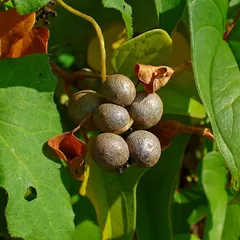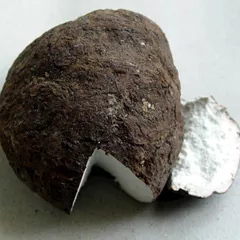Shen Qi Wan
Shen Qi Wan
Chinese: 肾气丸
Pinyin: Shèn Qì Wán
Other names: Golden Chest Kidney-Qi Pill,Kidney Qi Pill, Eight-Ingredient Kidney Qi Pill, Jin Kui Shen Qi Wan, Ba Wei Shen Qi Wan








Shen Qi Wan
Shen Qi Wan
Chinese: 肾气丸
Pinyin: Shèn Qì Wán
Other names: Golden Chest Kidney-Qi Pill,Kidney Qi Pill, Eight-Ingredient Kidney Qi Pill, Jin Kui Shen Qi Wan, Ba Wei Shen Qi Wan
Number of ingredients: 8 herbs
Formula category: Formulas that warm Yang and tonify
Conditions for which it may be prescribed: CystitisCataractGlaucoma and twenty three other conditions
Main actions: Tonifies and warms Kidney Yang
Contraindications: Contraindicated for Yin Deficiency pattern with a dry mouth and throat as well... Contraindicated for Yin Deficiency pattern with a dry mouth and throat as well as a red tongue with little coating. see more
Source date: 220 AD
Source book: Essentials from the Golden Cabinet
The information provided here is not a replacement for a doctor. You shouldn't use it for the purpose of self-diagnosing or self-medicating but rather so you can have a more informed discussion with a professional TCM practitioner.
Shen Qi Wan is a 8-ingredient Chinese Medicine formula with Prepared Aconite (Zhi Fu Zi) and Cinnamon Twigs (Gui Zhi) as principal ingredients.
Invented in 220 AD, it belongs to the category of formulas that warm Yang and tonify. Its main action is that it tonifies and warms Kidney Yang.
In Chinese Medicine health conditions are thought to arise due to "disharmonies" in the body as a system. These disharmonies are called "patterns" and the very purpose of herbal formulas is to fight them in order to restore the body's harmony.
In this case Shen Qi Wan is used by TCM practitioners to fight patterns like Damp-Phlegm, Oedema or Kidney Yang Deficiency. From a Western Medicine standpoint, such patterns can give rise to a range of conditions such as late menstruation, diabetes mellitus or hyperaldosteronism for instance.
On this page, after a detailed description of each of the eight ingredients in Shen Qi Wan, we review the patterns and conditions that Shen Qi Wan helps treat.
The eight ingredients in Shen Qi Wan

Zhi Fu Zi is a king ingredient in Shen Qi Wan. Like the name indicates, it means it has more power than other ingredients in the formula.
1. Prepared Aconite (Zhi Fu Zi)
Zhi Fu Zi is acrid and strongly warming. It tonifies the Fire of Gate, dispels Cold, and eliminates Dampness. It also strongly promotes movement and reaches down to the source to warm chronic Cold. Together, Zhi Fu Zi and Cinnamon twigs not only assist the Yang and enhance the metabolism of water, but also promote the unhindered dispersion of Yang throughout the body. The relatively small dosage of these ingredients suggests that they are intended only to slightly generate Yang in order to strengthen the Kidney Qi.

Gui Zhi is a king ingredient in Shen Qi Wan. Like the name indicates, it means it has more power than other ingredients in the formula.
2. Cinnamon Twigs (Gui Zhi)
Gui Zhi is acrid, sweet, and warm. It tonifies Yang, expels Cold and strengthens the Fire of the Gate of Life. It benefits the joints, warms the channels, and unblocks the vessels. It also promotes Qi transformation in the Bladder. Some sources have Rou Gui (Cinnamon bark) instead of Gui Zhi.

3. Prepared Rehmannia (Shu Di huang)
Part used: Prepared dried root tuber
Nature: Warm
Taste(s): Sweet
Meridian affinity: KidneyLiver
Category: Tonic herbs for Blood Deficiency
Shu Di huang is sweet and cooling. It enriches the Yin and generates Body Fluids. Its large dosage relative to the other ingredients reflects the importance of tonifying the Kidneys and replenishing the Yin, It also strongly enriches the Kidney Essence.

4. Cornelian Cherries (Shan Zhu Yu)
Part used: Dried ripe sarcocarp
Nature: Warm
Taste(s): Sour
Meridian affinity: KidneyLiver
Category: Herbs that stabilize and bind
Shan Zhu Yu tonifies the Liver and Kidneys, thereby helping to preserve the essential Qi while nourishing the Yin and reinforcing the Blood. Strengthening the Kidney Qi is beneficial to its role as repository of the body's Yin and Yang. It also ensures that nourishment will be supplied to the Liver, which derives its Essence from the Kidneys. The supply of Yin and Essence to the Liver serves to facilitate the free and smooth operation of its spreading function. It also restrains the leakage of Essence. It performs this function by inhibiting the improper dispersion and drainage through the Liver, thereby enabling the Essence to build up in the Kidneys.

5. Yam (Shan Yao)
Part used: Dried rhizome
Nature: Neutral
Taste(s): Sweet
Meridian affinity: KidneyLungSpleen
Category: Tonic herbs for Qi Deficiency
Shan Yao is Sweet and bland. It stabilizes the Essence by tonifying the Spleen. To reinforce the Essence and improve its function, the Spleen which is the source of postnatal Essence, must function properly. It is effective in treating Deficiency and various consumptive patterns.

6. Water Plantain (Ze Xie)
Part used: Dried tuber
Nature: Cold
Taste(s): Sweet
Meridian affinity: BladderKidney
Category: Herbs that drain Dampness
Ze Xie clears and drains the overabundance of Kidney fire. It is used here to prevent the rich, cloying properties of the chief herb Prepared rehmannia from congesting the mechanisms of the Kidneys, which will induce
even more fire from Deficiency.

7. Mudan Peony Bark (Mu Dan Pi)
Part used: Root barks
Nature: Cool
Meridian affinity: HeartKidneyLiver
Category: Herbs that cool the Blood
Mu Dan Pi clears and drains Liver Fire and is used here to counterbalance the warm properties of Prepared aconite.

8. Poria-Cocos Mushrooms (Fu Ling)
Part used: Dried sclerotium
Nature: Neutral
Taste(s): Sweet
Meridian affinity: HeartKidneyLungSpleen
Category: Herbs that drain Dampness
Fu Ling leaches out Dampness from the Spleen. It is paired with Yam to strengthen the transportive functions of the Spleen. This prevents the formula from clogging up the digestive process and reinforces the Spleen's function of nourishing the body. Fu Ling and Water plantain work together to improve the metabolism of Body Fluids an promote urination, thereby preventing a buildup of Stagnant Fluids.
Conditions and patterns for which Shen Qi Wan may be prescribed
It's important to remember that herbal formulas are meant to treat patterns, not "diseases" as understood in Western Medicine. According to Chinese Medicine patterns, which are disruptions to the body as a system, are the underlying root cause for diseases and conditions.
As such Shen Qi Wan is used by TCM practitioners to treat three different patterns which we describe below.
But before we delve into these patterns here is an overview of the Western conditions they're commonly associated with:
Late menstruation Diabetes mellitus Hyperaldosteronism Hypothyroidism Addison's disease Chronic glomerular Pyelonephritis Renal tuberculosis Nephritis Renal stones Cystitis Chronic urethritis Benign prostatic hypertrophy Paralysis of the detrusor muscle Urinary retention Vitreous opacity Chronic rhinitis Chronic tonsillitis Neurogenic tinnitus Periodontal disease Premature ejaculation Emphysema Chronic bronchitis Bronchial asthma Cataract Glaucoma
Again it wouldn't be correct to say "Shen Qi Wan treats late menstruation" for instance. Rather, Shen Qi Wan is used to treat patterns that are sometimes the root cause behind late menstruation.
Now let's look at the three patterns commonly treated with Shen Qi Wan.

Body Fluids (Jin Ye) is one of Chinese Medicine's vital subtances. Learn more about Body Fluids in Chinese Medicine
Damp-Phlegm
Pulse type(s): Slippery (Hua)
Symptoms: Nausea Obesity Fatigue No thirst Fat belly Oily skin Overweight Swollen limbs Yellow dark skin Profuse white sputum Sticky taste in the mouth Epigastric focal distention Focal distention of the chest
Shen Qi Wan is sometimes prescribed by TCM practitioners to treat Damp-Phlegm. This pattern leads to symptoms such as profuse white sputum, focal distention of the chest, epigastric focal distention and nausea. Patients with Damp-Phlegm typically exhibit slippery (Hua) pulses.
This Phlegm is associated with or deriving from Dampness. The typical manifestation is profuse amount of white sticky sputum which is easy to spit as well as overweight. For these middle age men who develop big, fat and soft bellies, there are often some degree of Damp-Phlegm.
The pattern can be... read more about Damp-Phlegm

Body Fluids (Jin Ye) is one of Chinese Medicine's vital subtances. Learn more about Body Fluids in Chinese Medicine
Oedema
Pulse type(s): Hidden (Fu), Slowed-down (Huan)
Tongue coating: Thick white coating
Symptoms: Fatigue Sore back Sore knees Cold limbs Eye swelling Loose stools Poor appetite Oedema of face Oedema of feet Oedema of legs Oedema of hands Oedema of ankles Oedema of abdomen Labored breathing Abdomen distension Urinary difficulty Feeling of heaviness General sensation of heaviness distention and fullness
Shen Qi Wan is sometimes prescribed by TCM practitioners to treat Oedema. This pattern leads to symptoms such as oedema of abdomen, oedema of ankles, oedema of face and oedema of feet. Patients with Oedema typically exhibit hidden (Fu) or slowed-down (Huan) pulses as well as Pale tongue with white sticky coating or white slippery coating.
Oedema (also spelled "Edema") a retention of Body Fluids that results in swellings, depending where the retention occurs: it can be in the limbs, the legs, the face, etc. The swellings are usually so that if one presses on it with a finger, the resulting dip takes a long time to disappear.
Oedema... read more about Oedema

The Kidneys is a so-called "Zang" Organ. Learn more about the Kidneys in Chinese Medicine
Kidney Yang Deficiency
Pulse type(s): Deep (Chen), Slow (Chi)
Tongue coating: Thin white coating
Tongue color: Pale
Tongue shape: Swollen
Symptoms: Asthma Chills Fatigue Dysuria Tinnitus Coughing Dizziness Weak legs Lassitude Impotence Sore back Pale face Back pain Dark face Tiredness Knee pain Depression Cold limbs Leukorrhea Weak Limbs Weak knees Infertility Loose teeth Late period Hot flushes Poor memory Loose stools Constipation Incontinence Night sweats Spermatorrhea Poor appetite Oedema of legs Abdominal pain Dripping urine Scanty periods Lower back pain Feeling of cold Low sperm count Sore lower back Premature aging Decreased libido Aversion to cold Cold extremities Oedema of ankles Vaginal discharge Frequent urination Urinary difficulty Pale color periods Abdominal fullness Cold and weak knees Persistent diarrhea Nocturnal emissions Cold hands and feet Premature menopause Infertility in women Night time urination Pale menstrual blood Premature ejaculation Incontinence of urine Prostatic hypertrophy Bright-white complexion Absence of menstruation Thin and watery periods Lower abdominal pressure Pale and abudant urination Thin body lacking strength Loss of hearing or deafness Spasms of the lower abdomen Cold in the lower extremities Edema of the lower extremities Weakness and aching in the knees Exhaustion from long-term illness Weakness of the lower extremities Thin and watery vaginal discharge Nocturnal emissions without dreams Sensation of cold in the lower back Soreness and weakness in the lower back Cold sensation in the lower half of the body
Shen Qi Wan is sometimes prescribed by TCM practitioners to treat Kidney Yang Deficiency. This pattern leads to symptoms such as lower back pain, dizziness, tinnitus and cold and weak knees. Patients with Kidney Yang Deficiency typically exhibit deep (Chen) or slow (Chi) pulses as well as Pale tongue.
Kidney Yang Deficiency causes Internal Cold and weakness. It indicates that the Fire of the Gate of Life, which is located between the two Kidneys and supplies fundamental warmth for the body, is also impaired. Therefore, the Organs lack warmth and cannot fully perform their... read more about Kidney Yang Deficiency
Formulas similar to Shen Qi Wan
Ba Wei Di Huang Wan is 100% similar to Shen Qi Wan
Liu Wei Di Huang Wan is 75% similar to Shen Qi Wan
Qi Ju Di Huang Wan is 75% similar to Shen Qi Wan
Gui Shao Di Huang Tang is 75% similar to Shen Qi Wan
Zhi Bo Di Huang Wan is 75% similar to Shen Qi Wan
Ba Xian Chang Shou Wan is 75% similar to Shen Qi Wan





